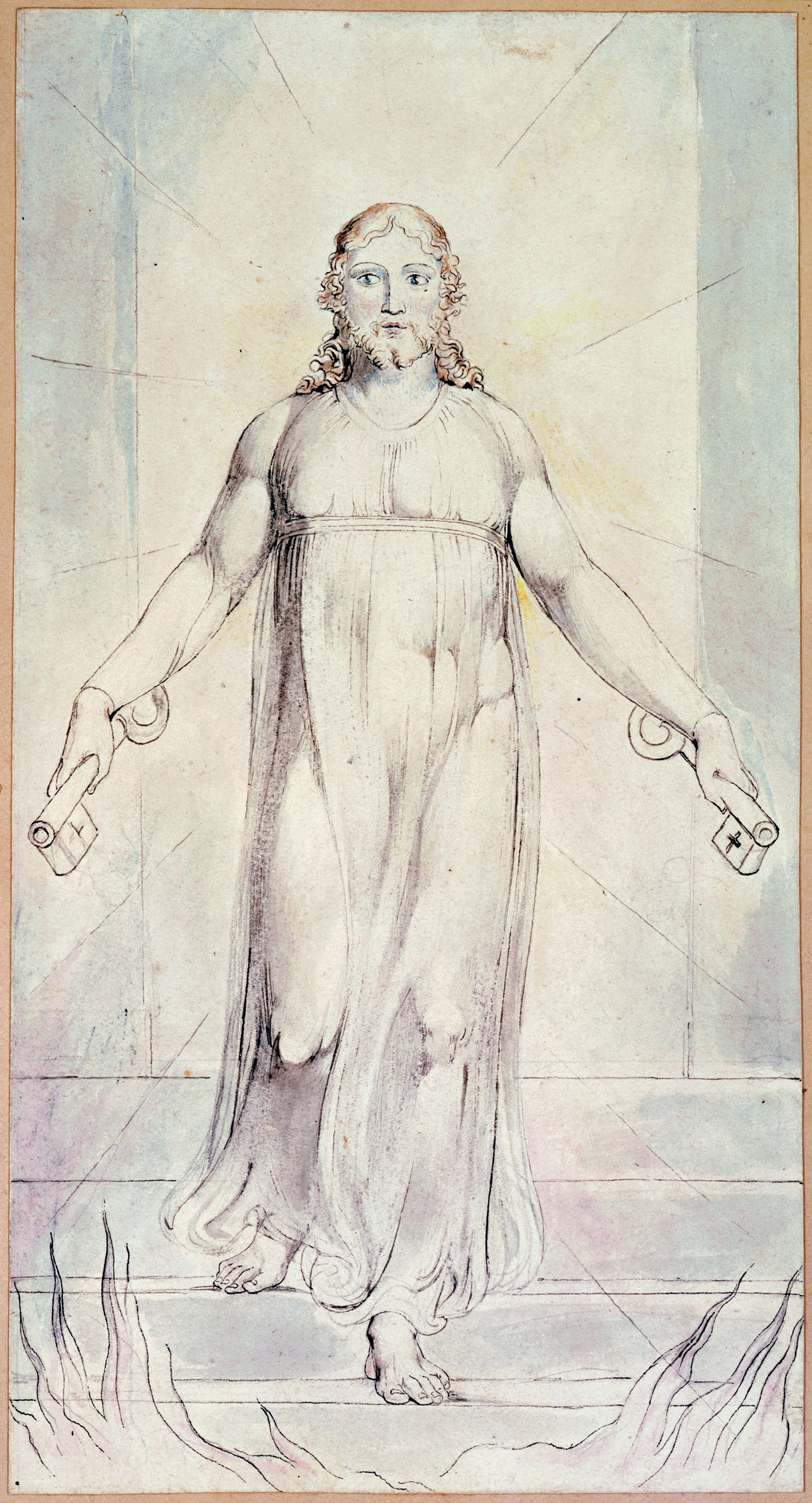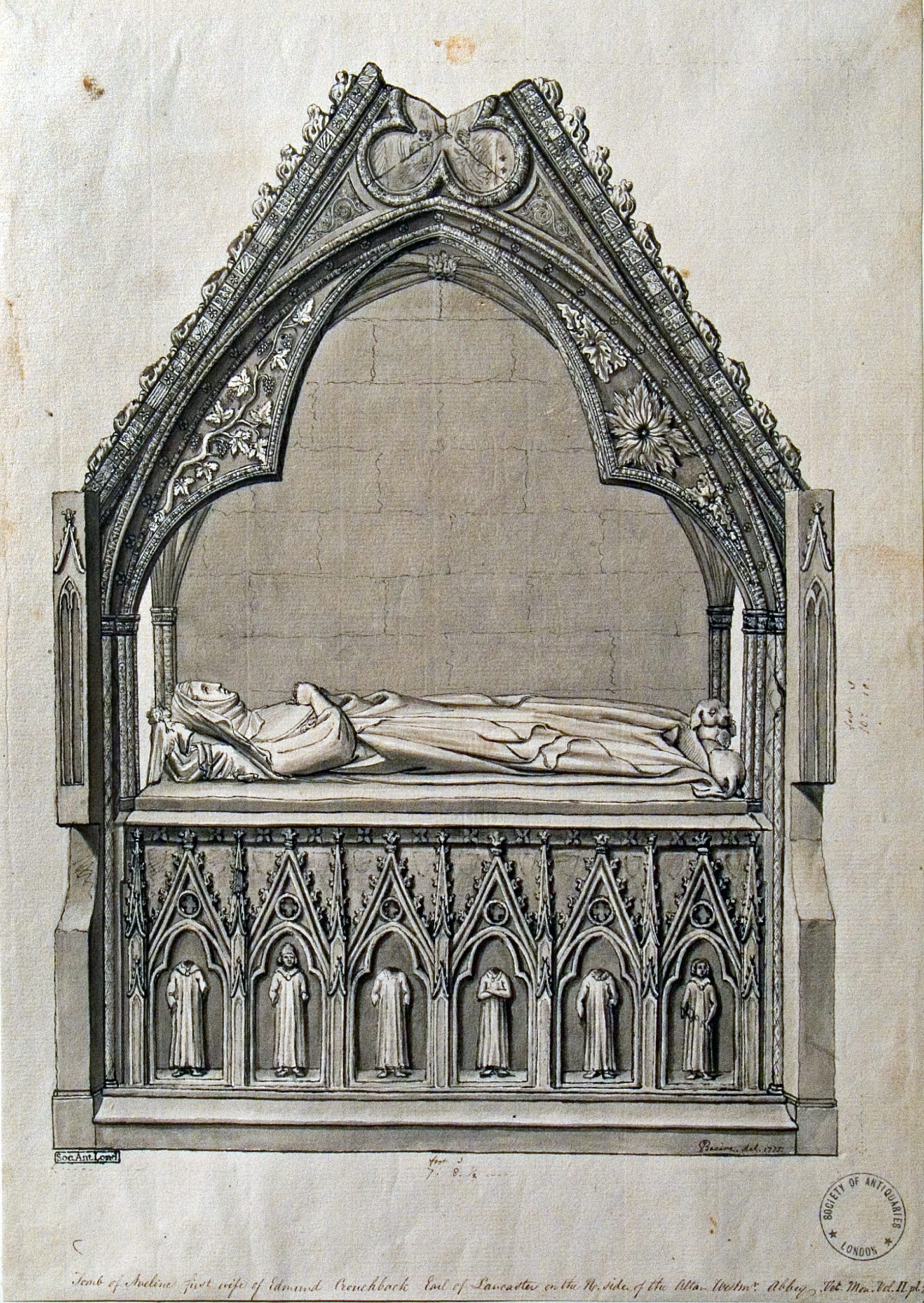Blake choose the cities which he used to represent Cathedral Cities because they had associations which could carry symbolic meaning. They could be used to represent attempts to embody spiritual characteristics which could protect Albion from making destructive decisions.
The first mentioned, Selsey, no longer existed but had been destroyed by flooding caused by the encroaching ocean. Her neighbor Chichester became the seat of her bishop, and the location of the courtroom where Blake himself was acquitted of treason in 1804. Damon associated the next mentioned, Winchester, with William Hayley who was instramental in Blake's move to Felpham. Richard Warner of Bath was cited by Damon for his courageous anti-war sermon. Damon continued through Blake's list of churchs mentioning prominent men who were associated with them including John Milton for Ely of Cambridgeshire. Milton, a graduate of Cambridge, fit the title of "Scribe of Los, whose pen no other hand Dare touch!"
Jerusalem, Plate 36 [40],(E 182)
"And these the Twenty-four in whom the Divine Family
Appear'd; and they were One in Him. A Human Vision!
Human Divine, Jesus the Saviour, blessed for ever and ever.
Selsey, true friend! who afterwards submitted to be devourd
By the waves of Despair, whose Emanation rose above
The flood, and was nam'd Chichester, lovely mild & gentle! Lo!
Her lambs bleat to the sea-fowls cry, lamenting still for Albion.
Submitting to be call'd the son of Los the terrible vision:
Winchester stood devoting himself for Albion: his tents
Outspread with abundant riches, and his Emanations
Submitting to be call'd Enitharmons daughters, and be born
In vegetable mould: created by the Hammer and Loom
In Bowlahoola & Allamanda where the Dead wail night & day.
(I call them by their English names: English, the rough basement.
Los built the stubborn structure of the Language, acting against
Albions melancholy, who must else have been a Dumb despair.)
Gloucester and Exeter and Salisbury and Bristol: and benevolent"
Jerusalem, Plate 41 [46], (E 188)
"Bath, mild Physician of Eternity, mysterious power
Whose springs are unsearchable & knowledg infinite.
Hereford, ancient Guardian of Wales, whose hands
Builded the mountain palaces of Eden, stupendous works!
Lincoln, Durham & Carlisle, Councellors of Los.
And Ely, Scribe of Los, whose pen no other hand
Dare touch! Oxford, immortal Bard! with eloquence
Divine, he wept over Albion: speaking the words of God
In mild perswasion: bringing leaves of the Tree of Life.
Thou art in Error Albion, the Land of Ulro:
One Error not remov'd, will destroy a human Soul
Repose in Beulahs night, till the Error is remov'd
Reason not on both sides. Repose upon our bosoms
Till the Plow of Jehovah, and the Harrow of Shaddai
Have passed over the Dead, to awake the Dead to Judgment.
But Albion turn'd away refusing comfort.
Oxford trembled while he spoke, then fainted in the arms
Of Norwich, Peterboro, Rochester, Chester awful, Worcester,
Litchfield, Saint Davids, Landaff, Asaph, Bangor, Sodor,
Bowing their heads devoted: and the Furnaces of Los
Began to rage, thundering loud the storms began to roar
Upon the Furnaces, and loud the Furnaces rebellow beneath
And these the Four in whom the twenty-four appear'd four-fold:
Verulam, London, York, Edinburgh, mourning one towards another"
Milton, Plate 36 [40], (E 137)
"My Vegetated portion was hurried from Lambeths shades
He set me down in Felphams Vale & prepard a beautiful
Cottage for me that in three years I might write all these Visions
To display Natures cruel holiness: the deceits of Natural Religion"
Jerusalem, Plate 34 [38], (E 180)
"Thus speaking; the Divine Family follow Albion:
I see them in the Vision of God upon my pleasant valleys.
I behold London; a Human awful wonder of God!
He says: Return, Albion, return! I give myself for thee:
My Streets are my, Ideas of Imagination.
Awake Albion, awake! and let us awake up together.
My Houses are Thoughts: my Inhabitants; Affections,
The children of my thoughts, walking within my blood-vessels,
Shut from my nervous form which sleeps upon the verge of Beulah
In dreams of darkness, while my vegetating blood in veiny pipes,
Rolls dreadful thro' the Furnaces of Los, and the Mills of Satan.
For Albions sake, and for Jerusalem thy Emanation
I give myself, and these my brethren give themselves for Albion.
So spoke London, immortal Guardian! I heard in Lambeths shades:
In Felpham I heard and saw the Visions of Albion
I write in South Molton Street, what I both see and hear
In regions of Humanity, in Londons opening streets.
I see thee awful Parent Land in light, behold I see!
Verulam! Canterbury! venerable parent of men,
Generous immortal Guardian golden clad! for Cities
Are Men, fathers of multitudes, and Rivers & Mount[a]ins
Are also Men; every thing is Human, mighty! sublime!
In every bosom a Universe expands, as wings
Let down at will around, and call'd the Universal Tent.
York, crown'd with loving kindness. Edinburgh, cloth'd
With fortitude as with a garment of immortal texture
Woven in looms of Eden, in spiritual deaths of mighty men"
Jerusalem, Plate 96, (E 256)
"Do I sleep amidst danger to Friends! O my Cities & Counties
Do you sleep! rouze up! rouze up. Eternal Death is abroad
So Albion spoke & threw himself into the Furnaces of affliction
All was a Vision, all a Dream: the Furnaces became
Fountains of Living Waters Howing from the Humanity Divine
And all the Cities of Albion rose from their Slumbers, and All
The Sons & Daughters of Albion on soft clouds Waking from Sleep
Soon all around remote the Heavens burnt with flaming fires
And Urizen & Luvah & Tharmas & Urthona arose into
Albions Bosom: Then Albion stood before Jesus in the Clouds
Of Heaven Fourfold among the Visions of God in Eternity
Plate 97
Awake! Awake Jerusalem! O lovely Emanation of Albion
Awake and overspread all Nations as in Ancient Time
For lo! the Night of Death is past and the Eternal Day
Appears upon our Hills: Awake Jerusalem, and come away
So spake the Vision of Albion & in him so spake in my hearing
The Universal Father. Then Albion stretchd his hand into Infinitude."
Blake's twenty-eight Cathedral Cities
1 Chichester - "lovely mild & gentle"
2 Winchester - "devoting himself for Albion"
3 Gloucester
4 Exeter
5 Salisbury
6 Bristol
7 Bath - "best and worst in Heaven and Hell"
8 Hereford, "ancient Guardian of Wales"
9 Lincoln
10 Durham
11 Carlisle
12 Ely - "Scribe of Los, whose pen no other hand Dare touch!"
13 Oxford - "trembled while he spoke, then fainted in the arms"
14 Norwich
15 Peterboro
16 Rochester
17 Chester
18 Worcester
19 Litchfield
20 Saint Davids
21 Landaff
22 Asaph
23 Bangor
24 Sodor, "Bowing their heads devoted"
25 Edinburgh
26 Verulam (Canterbury)
27 London
28 York








